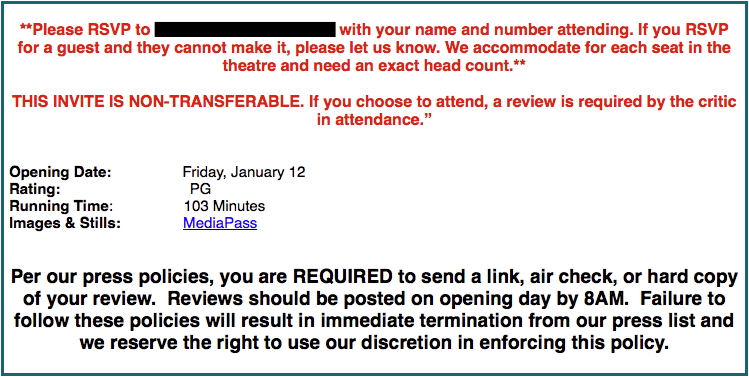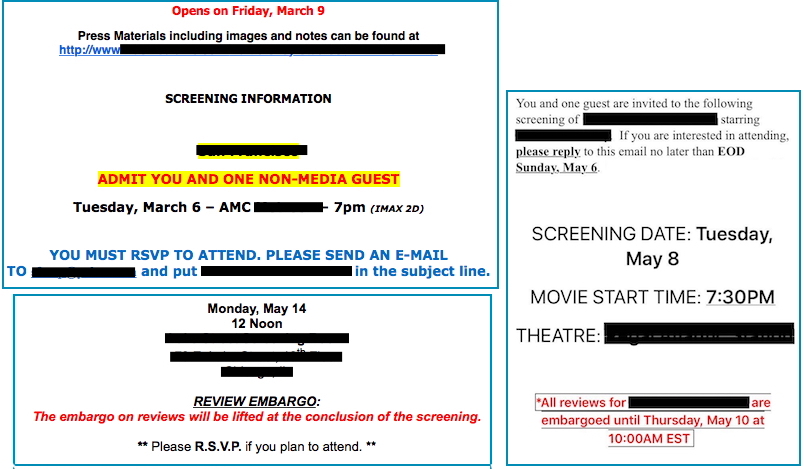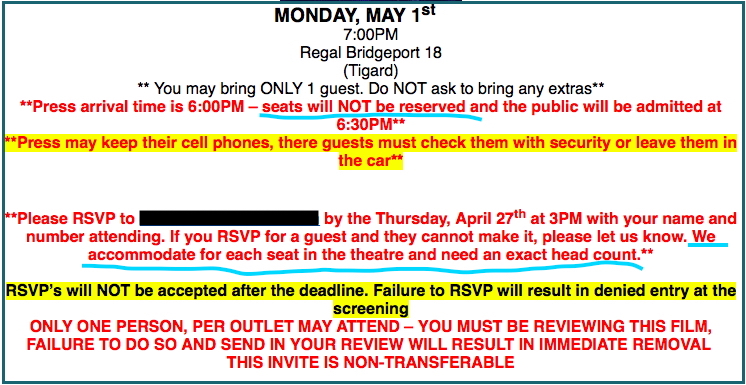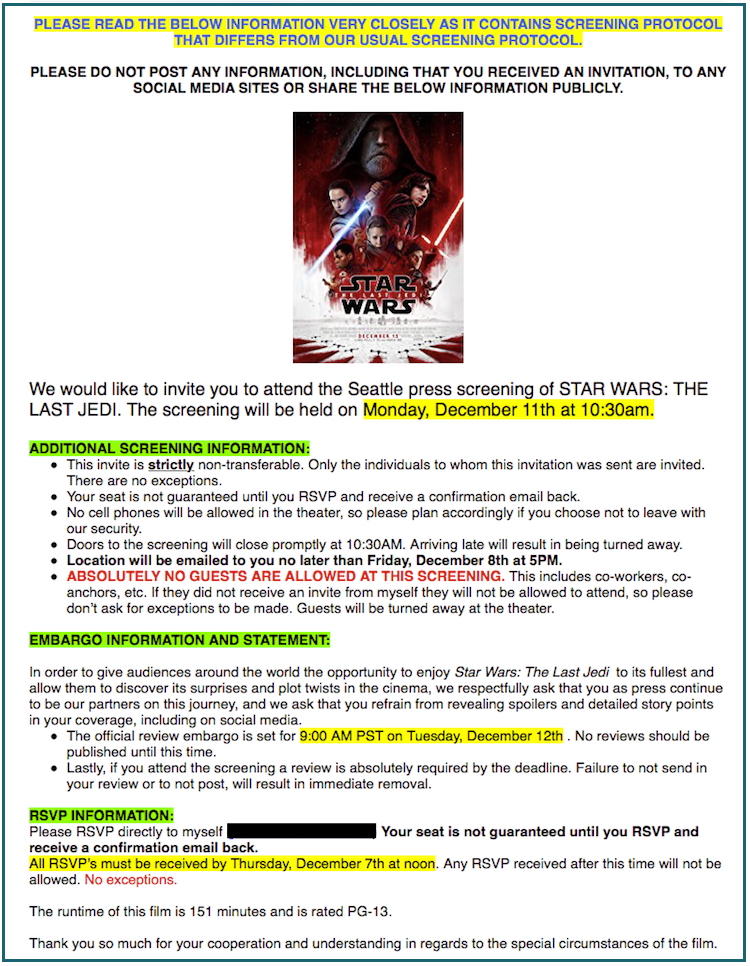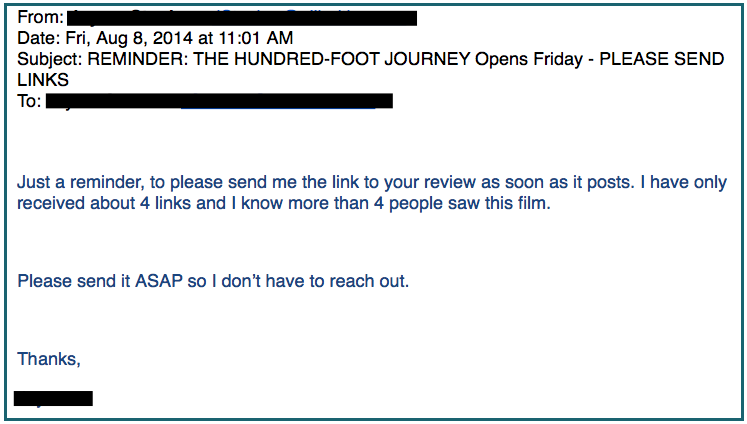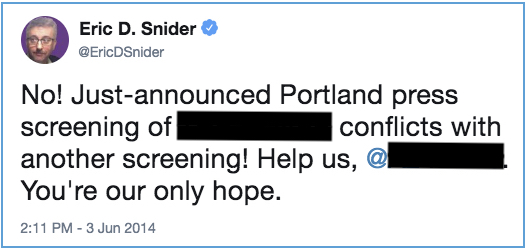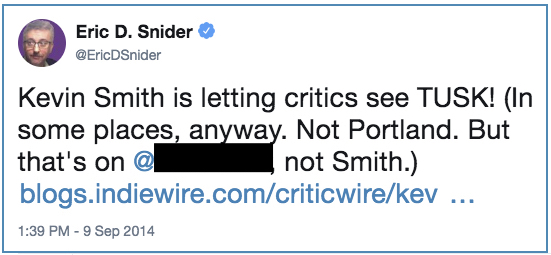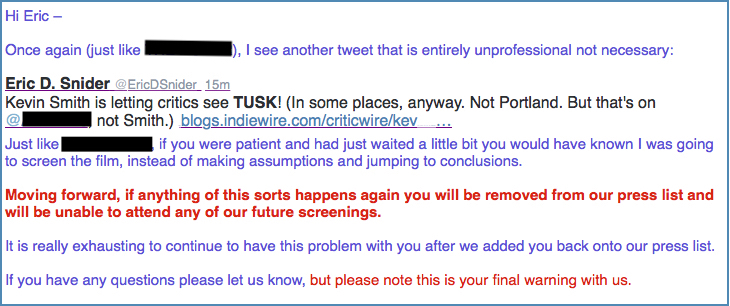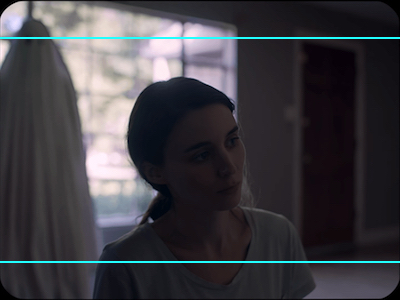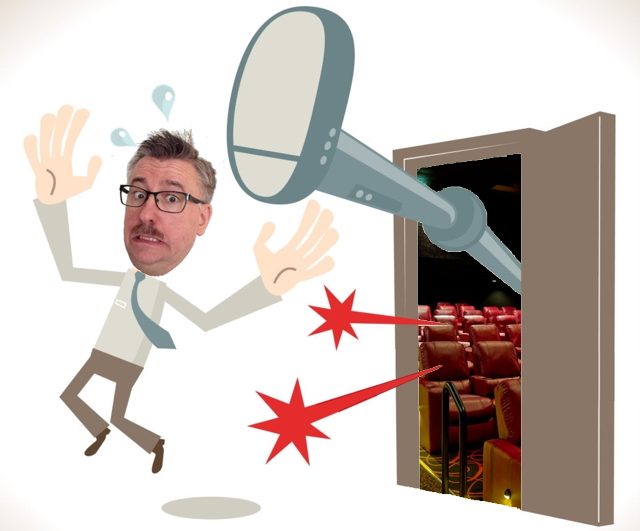
A few names have been changed in this story, including some of the publicity firms. [EDIT: Some names that were previously changed have been restored.] Legalities aren’t the issue. Looking through it, there’s nothing I wouldn’t say to the relevant parties’ faces or face equivalents, but it’s not meant to be a public calling-out or exposé of those parties. It doesn’t need to show up when you Google them. Essentially, it’s a rambling workplace anecdote about a peculiar aspect of an unusual profession that might be interesting to people who aren’t part of that world. Doesn’t matter what anybody’s name is; you don’t know them.
• • •
In February, I learned a surprising fact: I am no longer allowed to attend press screenings of movies. To review them, I must wait till they open and see them like a common peasant — like one of you people!
To be honest, this has proven to be a relief. Instead of wasting two or three evenings a week going to screenings that are anywhere from 20-45 minutes away and to which I must arrive at least 30 minutes early, and where the theater is packed to capacity with people who are excited to see a free movie and have often been standing out in the sun for two hours, and where the movies always start anywhere from four to 10 minutes late because they’re trying squeeze in as many people as possible lest anyone be turned away and have their feelings hurt — instead of that, I can see those movies Thursday night and Friday afternoon at a theater nearby where two-thirds of the seats are empty and we aren’t required to check our phones with security personnel beforehand and I can show up 15 minutes after “showtime” and miss most of the previews and leave when it’s over without having to wade through 200 people clogging up the doorway to collect their free posters.
Having access to press screenings was like having a third arm. It had its perks and impressed my friends, but it was also a lot of hassle, especially when the people in charge of coordinating activities for three-armed people don’t really like three-armed people and might not even think there should be three-armed people. And now that it’s been severed in an industrial accident, I realize: You know what, two is plenty.
You are probably wondering why this happened. The short answer is I don’t know. The long answer is as follows.
• • •
Wait, first, some background. Most movies are shown to critics a few days before they open, sometimes at private, press-only screenings (usually during the day), sometimes at evening promotional screenings where the general public is also invited. This is done in every major city in the country, with the studios contracting local publicity firms to coordinate the screenings and handle local promotions.
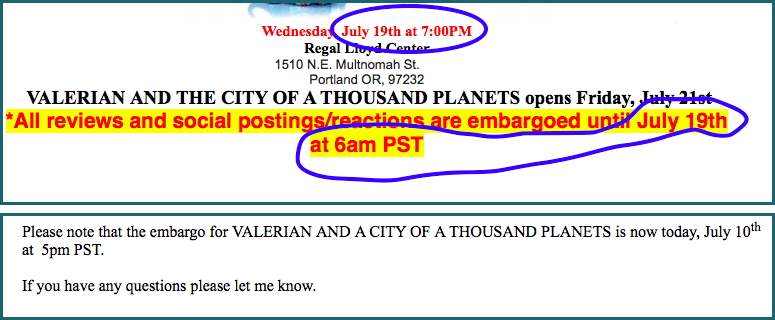
I started going to press screenings in Salt Lake City in 1999, and there’s always been a certain level of needless bureaucracy. You have smaller markets getting the same instructions from the studios as the big ones, resulting in silly things like requiring RSVPs for screenings in 200-seat theaters where there will be, at most, 10 people in attendance. Or we’d get emails dutifully informing us of the “embargo” (the earliest we’re allowed to post a review) of a movie that wasn’t screening for us anyway, or where the date would have already passed by the time it did screen. It’s very common for critics in different markets to be given different embargo dates, causing us to suspect that the local publicists are just makin’ ’em up.
Sometimes back in Salt Lake City we’d ask if a particular movie was going to be screened before it opened and we’d be told that it was not even though it actually was. This is what’s known as “a lie” (or as they call it in marketing, “communication”). These were cases where a promo screening was being held but the studio didn’t want critics there because they knew we wouldn’t like it, and rather than simply say, “I’m sorry, there is a screening but critics aren’t invited,” the publicists would claim the screening did not exist. This became especially funny when those same publicists would buy ad space in the local newspapers — the very newspapers we wrote for! — telling people where to go to pick up their passes for the screening that wasn’t happening.
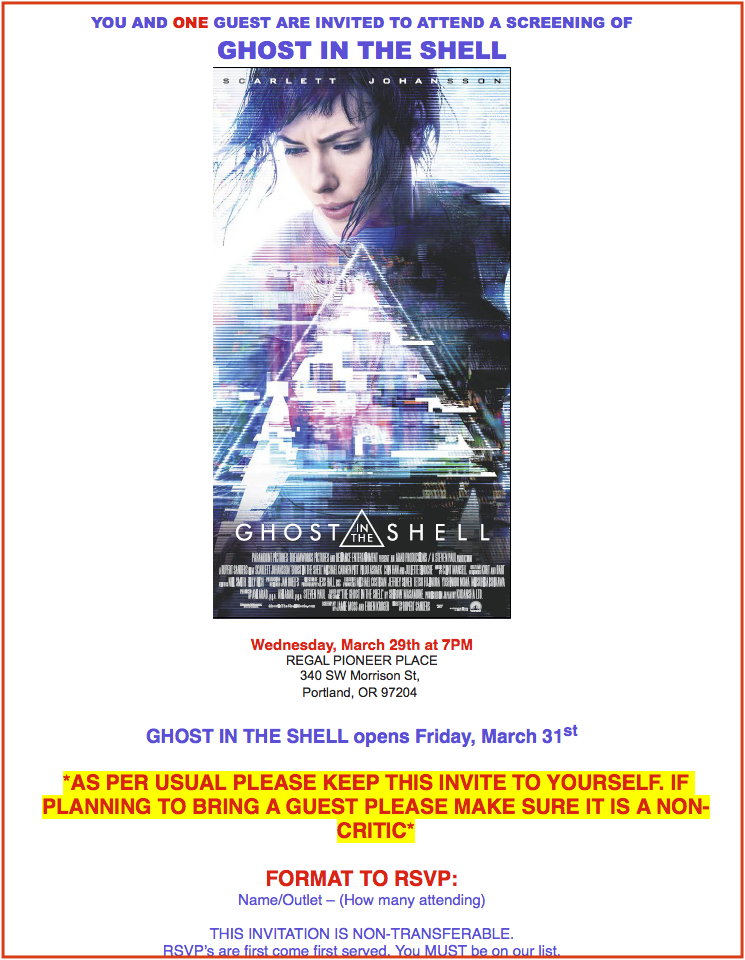 This practice became rarer as the publicists discovered that they weren’t our only source of information and that we sometimes browsed our own newspapers, but it still pops up occasionally — like last year, when Paramount only wanted certain critics to see “Ghost in the Shell” (as far as I could determine, print outlets were invited but not online outlets, because it’s 2005 at Paramount). Those not invited, if they asked, were told it wasn’t screening. Those who were invited were warned not to tell anyone it existed and were allowed to bring a guest — anyone in the world; it could have been Ann Coulter — as long as that guest wasn’t a movie critic.
This practice became rarer as the publicists discovered that they weren’t our only source of information and that we sometimes browsed our own newspapers, but it still pops up occasionally — like last year, when Paramount only wanted certain critics to see “Ghost in the Shell” (as far as I could determine, print outlets were invited but not online outlets, because it’s 2005 at Paramount). Those not invited, if they asked, were told it wasn’t screening. Those who were invited were warned not to tell anyone it existed and were allowed to bring a guest — anyone in the world; it could have been Ann Coulter — as long as that guest wasn’t a movie critic.
As with many privileges, being on the press list meant enduring a never-ending series of minor annoyances and insults. Due to a combination of paranoia and ignorance (the prime motivators in Hollywood), the studios would often hire security guards to confiscate our phones before a screening and keep an eye on us during it, even when it was only critics in attendance and even when it was a 3D movie and not pirate-able anyway. “We trust you enough to have you on our press list,” the studios seemed to say, “but we can’t be sure you won’t try something illegal and impossible.”
Anyway. In Portland, all screenings from the big Hollywood studios are handled by the Seattle office of Allied, a national publicity firm with branches in about 20 cities. Allied is the go-to firm for a lot of the studios, though the exact arrangements vary from one market to another. 1 When I moved to Portland, in 2005, the studio accounts were divided between Allied and two other firms, Turdwater & Associates and Flack Baffleman PR. Allied merged with Turdwater in 2011, and Flack Baffleman retired in 2017, giving Allied the monopoly. Allied likewise controls all or almost all screenings in Chicago, Atlanta, Philadelphia, Boston, San Francisco, San Diego, Denver, Detroit, Rochester, Charlotte, and Raleigh, to name the ones I’m aware of.
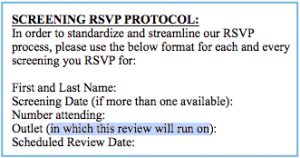 And while most of this nonsense is mandated by the studios and passed along to us by the local publicists, the folks at Seattle Allied seem to take special pride in embellishing it with their own all-caps, red-letter snippiness. Never have I encountered more officious, don’t-ask-questions haughtiness than with the Allied office in Seattle. I’m sure they are perfectly nice people in everyday life, but they rule their publicity fiefdom with tyranny that is only modestly efficient, like mean versions of a less competent Leslie Knope.
And while most of this nonsense is mandated by the studios and passed along to us by the local publicists, the folks at Seattle Allied seem to take special pride in embellishing it with their own all-caps, red-letter snippiness. Never have I encountered more officious, don’t-ask-questions haughtiness than with the Allied office in Seattle. I’m sure they are perfectly nice people in everyday life, but they rule their publicity fiefdom with tyranny that is only modestly efficient, like mean versions of a less competent Leslie Knope.
The general vibe toward the press is suspicion and hostility, like we’re an unruly classroom of miscreants. Which is understandable — to someone whose job is to make people have positive feelings about movies, critics are an unpredictable wild card that you’d be happier without. (You might think of us as a publicist’s third arm.) But usually there’s at least the pretense of working together with mutual respect. The tone out of the Seattle Allied office is controlling and short-tempered, like they think the critics on their press list work for them. You don’t question their instructions, second-guess them, or ask for clarification. You are not entitled to explanations. You are on the press list only because of their magnanimous nature.
This was the boilerplate at the bottom of every screening invitation:
For comparison’s sake, here’s what Allied invitations look like in a few other markets, all larger than Portland:
Strange how there are so many fewer instructions. Those screenings must be chaos!
Back to Portland. If the movie was a “special event” (read: Disney movie, because Disney is up its own butt about how special its movies are), it would look like this:
Or even this:
It’s worth noting that aside from being more obnoxious than they need to be — considering they are just emails telling us where and when to watch a movie — these instructions are also full of lies. To wit:
– “Seats will NOT be reserved.” Seats are reserved. There’s always a “screening rep” on hand to make sure things go smoothly, note audience reactions (they love everything), and tell Allied which critics showed up. This person tapes off a block of seats for critics, which stay taped off until the movie starts.
– “We accommodate [should be ‘account’] for each seat in the theatre and need an exact head count.” No they don’t, and no they don’t. Also, this statement contradicts the previous one.
– “FAILURE TO DO SO [review the film] AND SEND IN YOUR REVIEW WILL RESULT IN IMMEDIATE REMOVAL.” I forgot to send in links to my reviews about 80 percent of the time and was never called on it, not even when they were looking for reasons to get rid of me. A casual survey among colleagues reveals that hardly any of the local ones ever do it and the ones in other cities usually aren’t even asked to. This was the one actual rule that I ever actually broke, and there were no consequences. Meanwhile, there are people on the press list who don’t even write reviews anymore but still get invited.
Perhaps realizing how randomly the rule was enforced, they amended the boilerplate:

They’d go through phases where they were adamant about our sending in review links, which I gather isn’t so much to prove we’re doing the work but because the studios want them. (Why do we need to send them in when the publicists know where our work is published and how to find it? Dunno, but the publicists in other markets seem to have figured it out.) It wasn’t uncommon to get an email on Tuesday and another on Thursday reminding us that a movie was opening Friday and we needed to send our links in. We’d get these even if we hadn’t attended the screening, and it was always a separate email for each movie. Three new movies this week? That’s six emails reminding you to submit your links by 6 a.m. Friday. Sometimes these were accompanied by other emails warning us not to post our reviews any sooner than 12:01 a.m. Friday, which was always a fun combination.
Oh, and the passive-aggressive emails! Land sakes, what treasures those were. Here’s a good one, typical of the genre:
The person who sent the email knew exactly which critics had been at the screening. She could have emailed just the ones who hadn’t submitted their reviews yet, but she didn’t want to “reach out,” so instead she sent an email to everyone (which is NOT the same as reaching out, shut up), including the 80 percent of the press list that it didn’t apply to.
• • •
So anyway, speaking of lies, here’s the email I got from Judy, the boss at Seattle Allied, on Feb. 22:
“Hi Eric –
I have received a number of complaints lately, from multiple sources, about your continuous unprofessional and disruptive behavior and we can no longer tolerate it.
We have addressed these issues with you previously and have given you multiple opportunities to show us things had changed and, in good faith, even added you back to our press list after your previous ban. Your behavior has not changed so, effective immediately, you will no longer be invited to our screenings, will not be admitted as a guest and will also be removed from our press list.”
My reaction was the same as yours: What? I replied to ask for an explanation and got no answer. I emailed again a week later and continued to not hear anything, not a single citation of one of the “number of complaints” or any of the “multiple sources,” nary an example of my “unprofessional” or “disruptive” behavior. She could have just said, “It’s because you never sent in your review links like you were supposed to,” which wouldn’t have been the true reason but at least would have been a reason, but I suppose it was easier to just ignore me. (To be fair, she often ignored me before, too.)
You might be thinking: Can they just DO that? Don’t they have to have a good reason? Is the decision theirs alone? Is there no recourse? The answers are: yes, no, evidently, and not really. In the future, please do not ask so many questions at once.
Studios aren’t required to invite ANYONE to press screenings, or to even have them. They can set whatever criteria they want. I mean, if I thought I were being kicked out because of my race, gender, sexuality, or religion, that would be one thing. But while my race, gender, sexuality, and religion are all objectionable in various ways, I have no reason to believe any of them were the cause here. The studios are totally allowed to kick you off the press list just because they don’t like you. They do it all the time.
This raises (but does not beg) the question: Did “the studios” have anything to do with this? Sounds like it was all Allied and Judy. Which it was. Theoretically, I could have approached one or more of the studios to plead my case that their local publicists had overstepped their bounds and removed me from screenings that they, the studios, still wanted me to attend. Theoretically, a studio might have replied, “Some regional lackey has denied ERIC D. SNIDER access to press screenings WITHOUT CAUSE?! This is an OUTRAGE!” But in real life, I don’t have enough clout for anyone to care whether I see their movies or not. And besides, everyone in Hollywood is currently occupied with trying to seem like they respect women, so they don’t have time for me.
Mind you, I can still SEE the movies. They don’t even cost anything, really, thanks to MoviePass. 2 I just can’t go to the advance screenings, not even the free promos where every seat is filled with whatever pimps and hobos they can drag in off the street. Hooting yahoos and malodorous derelicts? Yes, please! Film critics who have run afoul of the local publicist in some unspecified way? BEGONE!
As I mentioned, this has been a net positive for me. You’re not breaking up with me, Allied; I’m breaking up with you! But I am curious what led to the ban. With no information forthcoming, I’m left to my own devices to figure it out. Judy’s email mentioned “these issues.” What does that refer to?
• • •
A Brief 3 History of “These Issues”
In 2006, I went on a press junket in Seattle for Oliver Stone’s raucous Paramount comedy “World Trade Center,” then wrote a column making fun of press junkets. Allied in Seattle, which had handled the junket, was deeply offended and kicked me off their press list, not just for junkets (which I’d never gone to before anyway) but for regular screenings, and not just for Paramount movies but for the other studios they handled as well (which at the time were just The Weinstein Company and Miramax). This is the “previous ban” Judy refers to, and it was applied nationwide, as I learned when I tried to attend an Allied screening in Salt Lake City in 2008.
In the meantime, I still went to the Portland screenings handled by the other two Seattle publicists. I also sometimes still went to the Allied screenings, the free public promos held in the evening. I would blend in with the crowd, sit somewhere other than the press row, and try not to let the screening rep see me. Then I’d make sure not to post my review until after the first opening-day screening, in case anyone was paying attention, which no one was.
In August 2009, my editor at Film.com — who was based in Seattle and knew these folks personally, and also was nice — was able to get me access to some Allied screenings in Portland. No Paramount movies, though (I had to keep sneaking into those), and I wasn’t allowed to deal with Allied directly but had to have my Film.com guy act as middleman, like divorced spouses who communicate only through lawyers. 4
In August 2011, as Allied was absorbing Turdwater & Associates, I managed to get back into their good graces by writing a subdued apology letter expressing remorse for having mocked the sacred junket system half a decade earlier. I was put back on the list, and things returned to the way they’d been prior to 2006, only now with bad blood between us.
In November 2012, I tweeted about a problem at a screening:
“LIFE OF PI screening started w/ wrong projection. 5 guards there to make sure we don’t pirate it, nobody cares if we can *watch* it.”
My frustration derived from the fact that it was a press-only screening with maybe 15 people in attendance, or approximately one security guard for every three critics, and that it was in piracy-proof 3D. For a lot of people who work for the Internet, especially those of us who work from home, Twitter is like the office water-cooler. It’s where we gab, vent, and chat about our jobs when we’re supposed to be working. This was the type of complaint that I knew my colleagues would relate to, so I shared.
But I got an email from Seattle Allied: “This puts me in a bad position with the studio and it is instances such as these that are making it hard to justify keeping you on our press list.“ I guess someone at the studio saw the tweet and was upset either that Allied hadn’t told them about the screw-up or that the screw-up had been publicized. Fair enough, no need to air the dirty linen in public. I apologized to Allied and deleted the tweet.
In June 2014, a screening of an indie film from small distributor A24 was scheduled opposite the only screening of “22 Jump Street,” which was being handled by the other remaining non-Allied publicist, Flack Baffleman PR. I told the Allied publicist about the conflict, but I had little hope. The Allied and Baffleman offices both liked to pretend that the other didn’t exist and generally made no attempt to resolve scheduling conflicts, similar to the way teachers assign homework as though theirs is your only class. Heck, sometimes screenings would conflict that had both been set up by Allied, even by the same person in the Allied office. They just didn’t care.
Anyway, concerning the smaller film, I tweeted:
“No! Just-announced Portland press screening of [THE MOVIE] conflicts with another screening! Help us, @A24. You’re our only hope.”
— tagging the studio to bring the matter to their attention.
Ninety minutes later, I got this email from Seattle Allied:
“Hi Eric –
I just found the below tweet:
If you would have given me a few hours, instead of posting a tweet like this that wasn’t neccessary, you would have realized I was well aware of the conflict after the fact and the screening was being changed.
I believe we have had issues with you in the past involving social media and being on our press list and things like this really don’t help, aren’t appreciated and really don’t entice us to want to keep you on our list.
If you have any major issues please come to myself or [the other boss in the office].”
Note that one doesn’t stay on Allied’ press list simply by being a member of the press who meets the eligibility requirements. One must “entice” Allied, give them some reason to want to keep you on the list. You really have to go the extra mile. After all, they’re doing you a favor by letting you see movies.
The problem here was that I didn’t know what I had done wrong. One of two things had happened:
1) Seeing my tweet, A24 contacted Allied and said, “Whoops, let’s reschedule the screening,” and Allied had to do a few minutes of work to handle that.
2) The office, aware of the conflict (because I told them, and I probably wasn’t the only one), contacted the studio to see about rescheduling it.
I suspect it was #1, because why else would Allied be mad about it? But either way, there was nothing wrong with my reaching out to the studio directly. At worst it was unnecessary (because Allied were already on the case), and at best it solved the problem (because Allied didn’t care about the conflict until the studio did).
I replied:
“Oh, sorry! I didn’t mean to suggest you guys were slacking or anything. I knew you were aware of the conflict [because I told you about it], and I was just trying to cover all the bases. I’ve had good luck in the past reaching out to the smaller distributors online. I certainly didn’t mean it as a slam against Allied, so I hope it didn’t come across that way.”
I received no reply.
In September 2014, press screenings for Kevin Smith’s “Tusk” had been set up in many markets around the country, but not Portland. I emailed Allied on Sept. 8 asking if there would be a screening. Nobody answered, because why would they? But I knew my friends in other cities had been notified of their screenings several days earlier.
That there were screenings at all was noteworthy because Kevin Smith had previously declared war against critics and said he wouldn’t screen his movies for them anymore (this very coincidentally occurred right after his movies started getting bad reviews). IndieWire ran an article about his change of heart, which I tweeted with this comment, a day after I’d asked Allied about a screening and heard nothing:
“Kevin Smith is letting critics see TUSK! (In some places, anyway. Not Portland. But that’s on @A24, not Smith.)”
TWO DAYS LATER — or three days after I asked — I got this email from Judy:
“Hi Eric –
Once again (just like [THE OTHER MOVIE]), I see another tweet that is entirely unprofessional not necessary:
Just like [THE OTHER MOVIE], if you were patient and had just waited a little bit you would have known I was going to screen the film, instead of making assumptions and jumping to conclusions.
Moving forward, if anything of this sorts happens again you will be removed from our press list and will be unable to attend any of our future screenings.
It is really exhausting to continue to have this problem with you after we added you back onto our press list.
If you have any questions please let us know, but please note this is your final warning with us.“
Mind you, I had “jumped” to the conclusion that it wasn’t screening because I had asked three days earlier and heard nothing and I knew screenings had already been announced in other cities. What I should have done, of course, was nothing. I was supposed to just know, somehow, that Allied was hard at work and too busy to reply.
But just like before, it’s not clear what I did wrong, or how I was “exhausting” poor Judy. One of two things had happened:
1) The studio saw the tweet and said, “He’s right. We should set up a screening in Portland,” then called Judy and had her take care of it. (This is not likely. I do not matter.)
2) The studio saw the tweet and said, “Hey, wait a minute. There is supposed to be a screening in Portland,” then yelled at Judy for not having set it up yet (or for setting it up but not telling the critics about it yet).
Either way: not my mistake, not my problem. It is not against the laws of decorum for a movie critic to contact a movie studio directly, nor is it unprofessional to do so on Twitter. Undignified, maybe, but that’s Twitter.
The problem, which I didn’t fully understand until it was too late, was that Allied Seattle’s definition of “unprofessional” was “anything that criticizes or comments on the manner in which films are marketed or that causes us additional work.” The people in that office also considered it “unprofessional” for me to speak publicly about the inner workings of the screening system, i.e., to talk about my profession. (I never blamed or named Allied or Judy or anyone else in my tweets.)
The thing is, if professional arrangements were dissolved every time there was mutual irritation, there would be no remaining professional arrangements. There’s always going to be friction between publicists and critics. We’re going to be annoyed at the persnickety emails, the nonsense rules, the frequent lies, and being ignored; publicists are going to be annoyed that we make fun of those things on Twitter. I bug you, you bug me; it’s the circle of life. You just have to accept that as part of the job — well, unless you’re in a position to unilaterally dispose of people who bug you without having to provide an explanation. Then you can just get rid of ’em.
• • •
In December 2015, the invitation for the “Star Wars: The Force Awakens” press screening (which I regrettably no longer have) marked a new zenith for unnecessarily fussy emails. I tweeted a screenshot of some of the excessive verbiage, a lot of which came from Disney but some of which was vintage Seattle Allied. Shortly thereafter, Judy called me on the phone and threatened to un-invite me if I didn’t delete the tweet. She said not only was I not allowed to tweet about screening problems, I wasn’t allowed to quote anything from a screening invitation, or even say publicly THAT A SCREENING EXISTED. I rolled my eyes and deleted the tweet. (When the next “Star Wars” came out, a year later, the invitation explicitly forbade us from telling anyone we’d received an invitation. I like to think that was my contribution.)
In February 2016, a screening for “The Witch,” another hotly anticipated indie film from A24 had again been scheduled opposite something else. Now, I want to make it clear that the earlier instance was a rare exception: Almost no screening conflicts in Portland ever got resolved. 5 Sometimes the invitation from Allied would even include a testy, preemptive, “Yes, we know there’s a conflict, there’s nothing we could do to fix it even if we wanted to, which we don’t” (I’m paraphrasing). They said the orders came from the studios.
Curiously, though, the studios seemed to be more flexible in other markets. Every time we had a schedule conflict, I’d ask my pals in other cities if the same movies conflicted there, too. They rarely did. Somehow, the screening that HAD to be Monday night in Portland could be held at other times in other cities. Huh! Either those other publicists were risking their jobs by going against strict studio orders … or maybe the studio orders weren’t THAT strict and my Allied people just didn’t want to do the extra work. Who can say?
The point is, it was futile to ask Allied about solving a problem like this. Experience had taught me that. But experience had also taught me not to tweet about it, because of the invisible clause in the contract that says whoever invites you to a press screening has authority over your Twitter account. So I emailed A24 privately to bring it to their attention. Rather than reply or take steps to resolve the issue, however, A24 simply forwarded my email to Judy, who sent me this:
“Hi Eric –
I received the email you sent over to A24 in regards to The Witch and the screening conflict that evening. I am well aware of all the conflict and unfortunately it’s unavoidable since this week and next week are all packed for evening screenings. The studio has requested us to screen The Witch in the evening, which is why I didn’t schedule it during the day. [That may be true, but let me point out that this movie had press screenings at other times of day in other cities.]
As you know from your longtime experience in this business that conflicts definitely will arise and things will screen against each other. We try our best to avoid these situations as much as we can, but sometimes we just aren’t able to accommodate every single person. Unfortunately, like I mentioned in my email before, this screening of The Witch will be the only one in Portland.
Finally, I know I have mentioned this numerous times before, but since you received my email, you know I handle A24. All inquiries about the studio and their films should be directed to me. If you write the studio, the emails always get sent back to me anyway, so if you have any issues or questions please direct them to myself or the other publicists in this office.”
Imagine a film critic interacting with a film studio without using a local publicist as intermediary! Why, to get away with such an audacious act, a critic would have to … I don’t know, live somewhere other than Portland, I guess.
I replied:
“Hi Judy —
I wasn’t trying to sneak around you or anything. In fact, I almost copied you on the email so you’d be in the loop.
Here was my thinking: I knew that *you* knew about the scheduling conflict. But I didn’t know if A24 did! And I thought there was a chance, especially with a smaller movie like this one, that they’d want to reschedule it if they knew.
But I also knew that if I asked you to ask them about the possibility of changing it, your answer would be: “This is when they told us to schedule it, so no, I will not tell them there’s a conflict and ask if we can change it.” So I was just trying to streamline the process, go right to the source, etc. No disrespect intended.
I don’t really understand all the internal workings of the studio-publicist-press relationship. But I do know that in [city redacted, let’s call it Pooville], there are almost no screening conflicts, even ones that conflict in Portland and elsewhere. Why? Because the Pooville Allied office works with the studios and the critics to avoid them. (Example: two movies were recently scheduled for 7:00 the same day, so they moved one to 4:30 so critics could see both.)
Now, I don’t know if that means the studio reps that Pooville deals with are more easy-going than the ones you deal with, or if the Pooville people are risking their necks making unauthorized changes, or what. I’ve never been on the publicist side of things, so I don’t know the details of how that process works. And I know a person could go insane trying to figure out studio marketing “logic.” 🙂
Anyway, I think we all want approximately the same thing: for as many journalists as possible to cover as many movies as possible. That’s all this is about, nothing personal.”
I received no reply.
We had no further issues until I got the email kicking me off the press list, so I don’t know what prompted it. I’d had an argument with another critic several days earlier (he claimed he wasn’t an embarrassing hack; I took the opposing view), but that wouldn’t fall under the category of “these issues” and would be even less of Judy’s concern than my tweets are. But it’s the only thing out of the ordinary that had happened recently. But on the other hand, if there were a specific “last straw,” wouldn’t she have told me what it was? She’d certainly never been shy before about detailing which of my actions displeased her. But on the third hand (maybe I need three arms after all), if there wasn’t a last straw, then why now? Did she just wake up that morning and think, “I am DONE with that insubordinate bastard”?
So I don’t know. Since it wasn’t one of the usual “these issues,” I have to expand my definition of what “these issues” might refer to. What other interactions had I had with Allied? Well, let’s see…
• • •
Screening Problems
Even though screenings are held at regular movie theaters that are accustomed to showing films all day every day, about one in 10 screenings begins as if it were the first day of operations and the staff had been replaced by a family of otters. There’ll be picture but no sound, or sound but no picture, or they can’t figure out how to play the movie at all, or the movie says “directed by Michael Bay” on it. Usually these problems are solved in a few seconds, but sometimes they aren’t.
I mentioned “Life of Pi” earlier. Other famous entries on the list of massive theater screw-ups include:
– “Everything, Everything” was in the wrong aspect ratio, the top and bottom of the image cropped like this:
Not a huge issue except that people’s faces were cut off during close-ups, and in the movie’s one subtitled scene, the subtitles were not visible.
I told the screening rep about the problem, and he went to the theater manager, who told him it was impossible to fix without stopping the movie and starting over. That isn’t true — there is a way; this manager just hadn’t been taught how. Anyway, we watched the whole movie in the wrong aspect ratio.
– “A Ghost Story” had a peculiar shape anyway: almost square, rounded at the corners, like an old photograph. But when the movie started, the projectionist (different theater this time) had cut off the top and bottom:
Another critic was present who works as a projectionist at his day job. It took him 10 minutes to 1) convince the theater manager there was a problem and 2) show him how to fix it. The movie kept playing during this time, of course. (When the image was fixed, another critic in attendance, who happens to be an embarrassing hack, bellowed, “Now it’s worse!” I think this was his dumb jokey way of saying he didn’t like the movie and liked it even less now that he could see more of the image, but maybe he really thought it looked worse this way, on account of his being an embarrassing hack.)
One recurring problem at a particular crappy multiplex that I won’t name but if you live in Portland it’s the one you’re thinking of [Regal Lloyd Center] was low volume. Sometimes it seemed like some of the speakers weren’t on; sometimes they were on but not loud enough. It became regular practice to ask the screening rep to ask the manager to turn it up. Then the rep started checking with us (me and the tall critic usually sitting next to me) shortly after the movie started to see if everything looked and sounded right. This seemed like a good system.
Did the screening rep not like having problems reported to him? Did Judy not like being told that there had been problems? I usually emailed her the next day about the major issues, not little things like the volume being low or Vin Diesel being in the movie. She sent an email near the end of 2017 asking us for specific examples so she could address them with the theaters, so it seems like she wanted to know. But maybe that was a trap to see who her “complainers” were, and maybe I was the only one who responded.
• • •
Here’s what I know:
• Allied is a marketing firm. Their job is to present their clients’ products in a positive light, regardless of the quality of those products, many of which are abominable. Movie critics, on the other hand, are supposed to give honest opinions, discuss strengths and weaknesses, and make fun of Michael Bay. This may or may not be good publicity for the movie in question (unless you believe all publicity is good publicity — which I get the impression publicists don’t), and the inability to control the message as with other aspects of marketing must be frustrating. Publicists have always viewed critics as a necessary evil, but the philosophy at Allied seems to be that they’re merely a nuisance and maybe not that necessary.
• The people in charge in Seattle don’t like it when I tweet “inside baseball” stuff about the screenings. (I don’t know how they feel when other people do it.) There’s no rule against it, and there are no trade secrets being revealed, and I never criticized them directly,6 and they’re not the boss of me, but they don’t like it.
• The people in charge in Seattle really, really like being in charge. They like creating hoops to be jumped through. They enjoy having complete, unquestioned authority, and they perceive communication with anyone else as a threat to their power. They’re kind of like dictators, except not elected.
• I’m missing a few freelance opportunities by not seeing movies in advance, but not many. My reviews are funded by patrons, who so far don’t mind that they’re being posted 12-24 hours later than before. Press screenings are getting rarer anyway: Of the 57 wide releases so far in 2018, 23 of them — a full 40 percent — didn’t screen for critics in Portland (any critics, not just me) before they opened.
I used to think the annoyances, the commutes, the wasted time, and the general exhausting rigamarole of advance screenings were outweighed by the benefits. Now I see that this is not true. While it would sometimes be useful to have access to press screenings, I wouldn’t attend them regularly anymore even if I could, now that I’ve seen the other side. It’s freer here. Join me, critics. JOOOOIIIIN MEEEE.
I’ll see you at the movies! Please don’t sit near me!

